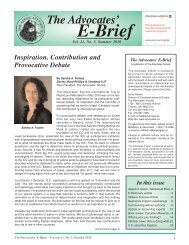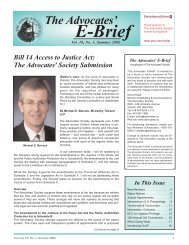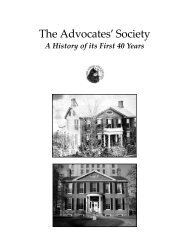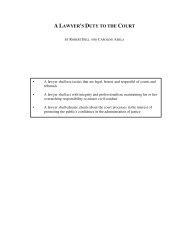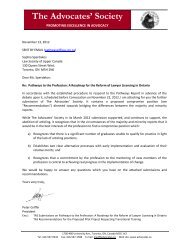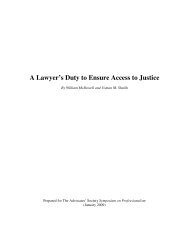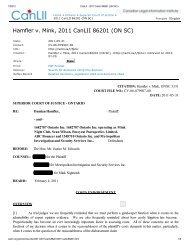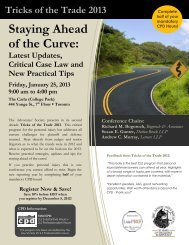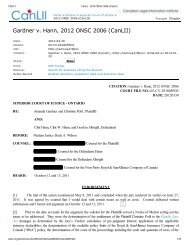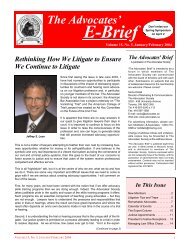Litigation Process a.. - The Advocates' Society
Litigation Process a.. - The Advocates' Society
Litigation Process a.. - The Advocates' Society
You also want an ePaper? Increase the reach of your titles
YUMPU automatically turns print PDFs into web optimized ePapers that Google loves.
- 4 -<br />
<strong>The</strong> key to developing useful and admissible expert testimony is twofold; true<br />
qualifications and true independence. After the Goudge Inquiry, there is a heightened<br />
awareness of the need to be vigilant in assessing these criteria. Neither one is more important<br />
than the other. Both are essential and counsel must be confident that their chosen expert can<br />
withstand a searching inquiry on each. This includes the extent to which counsel has been<br />
involved in instructing the expert and in the preparation of the report. Counsel’s instructions are<br />
producible and counsel should conduct themselves accordingly. No court is likely to believe that<br />
counsel was completely uninvolved in reviewing drafts and providing comments, though many<br />
advocate this approach. This is a counsel of perfection that is likely to be observed in the<br />
breach. But counsel, like the expert, can police themselves and ensure that any commentary, is<br />
fair and objective and does not lead the expert into any area of advocacy. Any involvement of<br />
counsel must be able to withstand the scrutiny of the trial judge.<br />
For an expert to truly understand his or her role in the trial process would require a legal<br />
education. But there are some basic concepts that are easily summarized which will assist<br />
experts, especially those who have not testified before, in understanding some of the more<br />
technical aspects of giving expert testimony.<br />
<strong>The</strong> Admissibility of Expert Evidence at Trial<br />
Expert evidence may be tendered at trial as an exception to the rule against hearsay<br />
evidence that confines witnesses to testifying as to matters of fact as opposed to matters of<br />
opinion. <strong>The</strong> rationale for the exception to the hearsay rule allowing experts to tender opinion<br />
evidence was articulated by Dickson J. in R v. Abbey.<br />
With respect to matters calling for special knowledge, an expert in<br />
the field may draw inferences and state his opinion. An expert’s<br />
function is precisely this: to provide the judge and jury with a<br />
ready-made inference which the judge and jury, due to the<br />
technical nature of the facts, are unable to formulate. An expert’s<br />
opinion is admissible to furnish the Court with scientific information<br />
© 2012 <strong>The</strong> Advocates’ <strong>Society</strong>. <strong>The</strong>se materials may not be reproduced, published, distributed<br />
or posted on-line without the written permission of <strong>The</strong> <strong>Advocates'</strong> <strong>Society</strong>.



